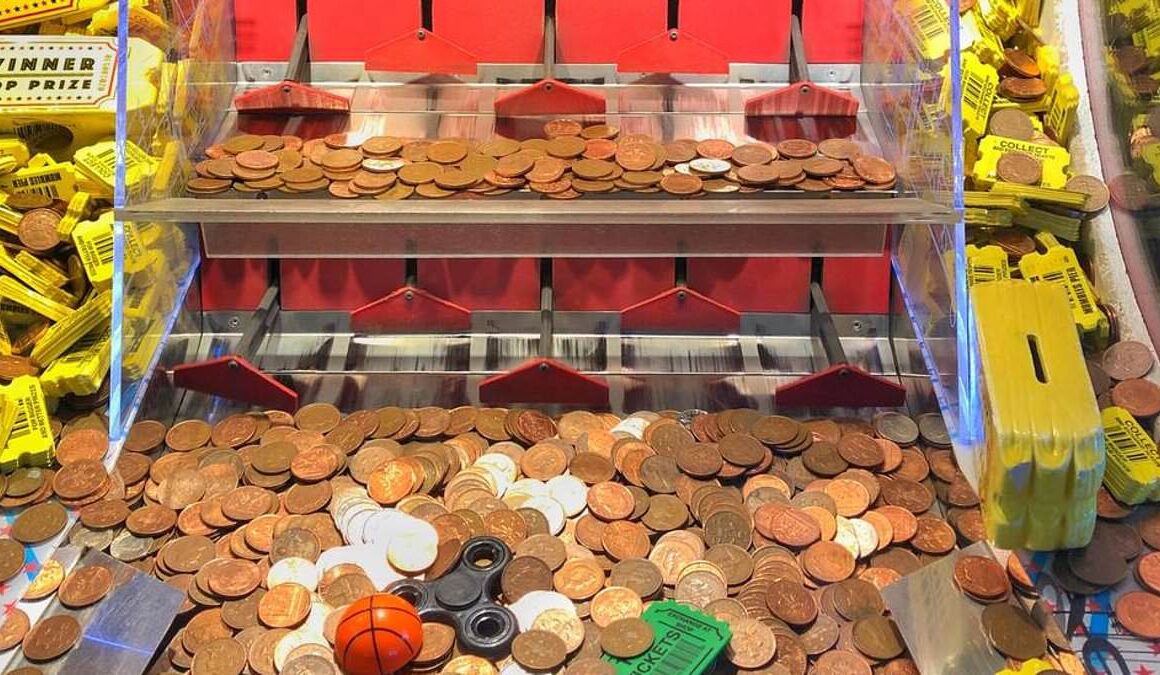Shoppers have reacted with sadness at the prospect of pennies being scrapped as many fear prices will be rounded up in supermarkets and at arcades.
Yesterday, it emerged the Treasury had no plans for more copper coins to be minted in the coming years.
Seaside piers could never be the same again if penny arcades are done away with – although some fear they could be replaced by even more costly 5p and even 10p machines.
It came as the Royal Mint has not been asked to produce new coins of any kind this year.
The move has sparked criticism, with one former Conservative pensions minister warning the cost of many basic items would be rounded up to the higher full pound amount and hit vulnerable older people hardest.

Shoppers have reacted with sadness at the prospect of pennies being scrapped as many fear prices will be rounded up in supermarkets and at arcades

Brits face paying more for everyday essentials on the high street if Treasury stops producing 1p and 2p coins, business leaders warn

Cash made up just 12 per cent of all payments last year, according to figures published by industry body UK Finance. By contrast almost four in ten payments were contactless
There are few products you can buy with a single 1p or 2p coin but they are often given as change for items that cost £1.99.
Former pensions minister Ros Altmann said: ‘[Removing them from circulation] will just lead to higher prices in the shops. For those on low incomes who use cash, especially the poorest pensioners, every penny counts.
‘The cost of many basic items are often just under a whole pound to make them more attractive but either the prices will be rounded up to the higher full pound amount as change can’t be given or those using cash will have to pay the whole pound which will cost them more.’
The Federation of Small Businesses has also warned that card providers could charge higher prices if consumers have less choice over how to pay.
Craig Beaumont, from the FSB, added: ‘Due to inflation, there will inevitably be a moment when – just like the halfpenny – the lowest denomination of coins are phased out of the system.




Dismayed shoppers vented their fury on social media after hearing the news
‘The fact that 1ps and 2ps already had to change their metal content due to their inherent worth exceeding their face value shows the likely direction of travel. But it will be a case of when – and [that’s] when consumers are ready.’
If the coins are scrapped, this would mark the first such change since 1984 when the halfpenny coin was taken out of circulation.
The decision, by then chancellor Nigel Lawson, was made when the coin became more expensive than its value to mint.

If the coins are scrapped, this would mark the first such change since 1984 when the halfpenny coin was taken out of circulation

Former pensions minister Ros Altmann warned that scrapping 1p and 2p coins could hurt vulnerable older people

A rail passenger in a photo dated from 1970 uses a public telephone by putting a 2p coin into money slot
Last night the Treasury denied it was planning to scrap 1p and 2p coins completely.
Instead a spokesman said it was ‘confident’ there are enough coins in the system ‘without the need to order more this year’.
But officials are said to be considering a range of scenarios for the coppers’ future as Britain increasingly becomes a cashless society.
Cash made up just 12 per cent of all payments last year, according to figures published by industry body UK Finance yesterday.
By contrast almost four in ten payments were contactless.
Proposals over the future of coppers are set to be put forward for discussions with ministers, the Evening Standard reported.
Latest Royal Mint figures show no new 2p coins have been minted since 2021 when 118 million were produced. The most recent 1p coins were made in 2022, when 30 million were produced.

No new 1p and 2p coins are expected to be ordered in the coming years with proposals being worked on to be put to ministers over the future of the coinage
The Royal Mint said: ‘We continue to work closely with the Treasury to meet demand from UK cash centres.
‘We seek agreement from the Treasury to manufacture coins to meet demand as required, and we have a buffer stock of coins to ensure a consistent supply.’
It added that there are approximately 27 billion coins of all values in circulation.
Changes have already been made to the metal content of lower value coins in recent decades because of the increasing price of materials.
Traditionally, they were made from an alloy of copper, tin and zinc. But, since 1992, they have been produced using copper-plated steel.
In 2019 then chancellor Philip Hammond ditched proposals to scrap them despite warnings inflation had diminished their value.










